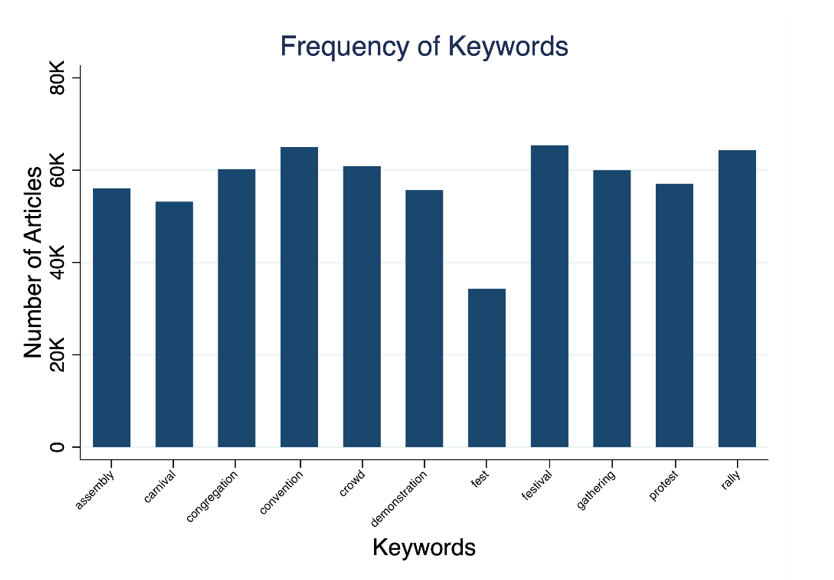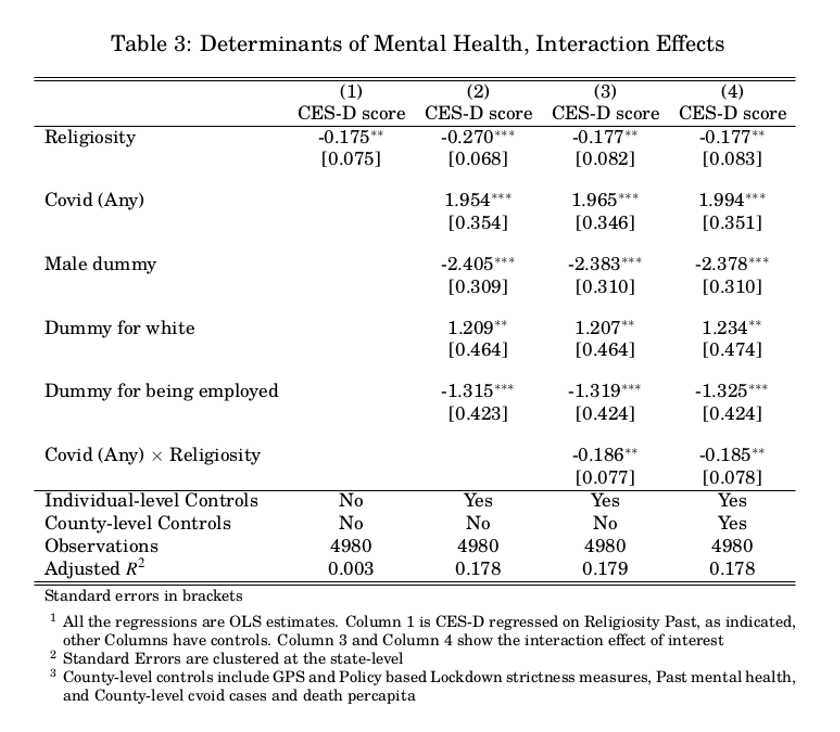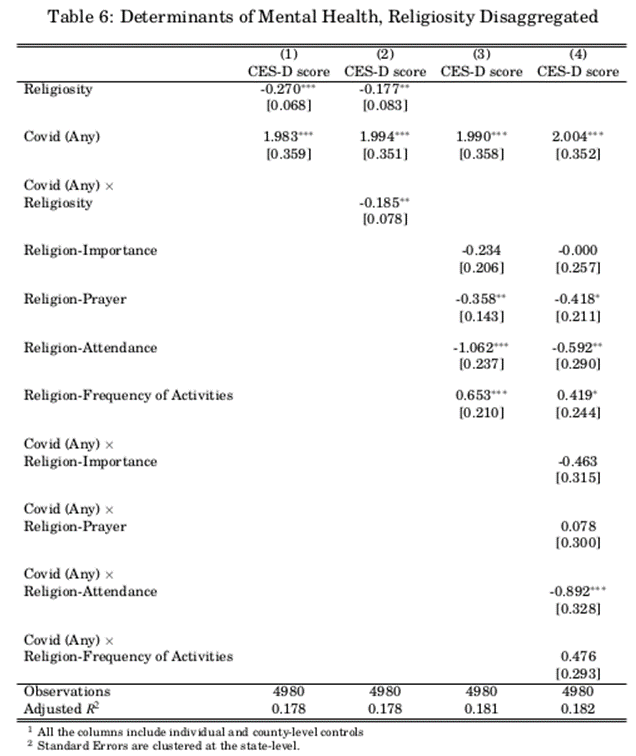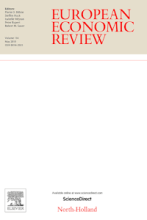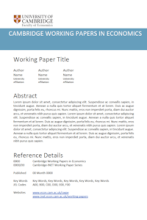This project aims to understand how religious gatherings and religious networks spread infectious diseases such as Covid-19. Second, we aim to understand how Covid-19 induced restrictions and the inability to attend in-person religious congregations have affected mental health. Our study is based on the United States, a country characterized by enormous religious diversity and variations in socioeconomic status.
In our original proposal, we aimed to test the above hypothesis by collecting data across the globe to look at areas with large and small congregations and how this correlates with the incidence of Covid-19. We are currently using a web crawler to gather all reports that could be about any form of gatherings in the US from January 2018 to December 2021. We will then use machine learning algorithms to sift through them and create a dataset of relevant gatherings. We would then check if these are correlated with spikes in Covid infections and if so, what kinds of gatherings were more likely to lead to an increase in Covid cases. We are currently sifting through approximately 740,000 “gathering type” news articles in the US between 2018 and 2022, and an illustration of the main keywords used across the news articles is shown in the graph below.
Once this data has been assembled, the study will explore the differences in the effects of small frequent gatherings (as mandated in Christianity and Islam) versus larger, infrequent gatherings (such as those that happen during religious festivals) to study how the infection spreads. The findings will have important implications for managing religion and public health in multi-religious societies, especially in a pandemic.
The second part of our project examines the interaction of religion and Covid-19 induced restrictions on mental and physical health. While religious gatherings themselves have been purported to fuel the rate at which the infection has spread across the globe, it is important to study the effect that consequent lockdowns and social distancing measures have had on religiosity and mental health. As public health measures restricted gatherings of all kinds, it significantly affected followers of religions that mandate regular communal gatherings at places of worship. This has significant consequences for the way people practice their religion, not least because being physically present at a place of worship cannot be substituted easily with electronic means of team communication.
To test the second hypothesis, between January 2020 and December 2020 we conducted online surveys among 5178 participants which elicited responses on how the Covid-19 restrictions affected: i) the way people practice their religion, ii) whether religious congregations had moved online and how iii) how disruptions in practicing one’s faith have affected mental health.
The survey was designed using the Qualtrics Research Services platform. The survey questionnaire is accessible online here: https://uwa.qualtrics.com/jfe/form/SV_896ItWENhTeZMXA
The final survey collected data from 5178 individuals, in all states of the US between February-March 2021, after trialling the questionnaire in the two states of West Virginia and Maryland. We measured strictness of lockdown implementation using data on the decrease in time spent outside the home as collated by https://tracktherecovery.org/ using anonymised location data released by Google.
In the survey, we found a high incidence of depression. More than 62% of the respondents can be classified as depressed based on the CES-D scale (one of the leading indicators used in clinical studies of depression). A little less than 49% of the sample reported themselves or a member of their immediate social network as having tested positive for Covid-19. We also found a range of different methods of accessing religious activities during the lockdown, including online services.
We then analysed the data and have a working paper that we are currently writing up for publication.
Some of the main results of the paper are in the tables and graphs below:
In Table 3 above we see that the negative correlation of Covid with mental health (seen here as a positive association with CES-D scores) is countered to some extent by the past religiosity of the individual seen as the negative coefficient on the interaction term. Table 6 shows that this effect is primarily driven through religious attendance.
We have presented the research findings at different places and have some published output from the project as well.
Professor Iyer has presented this in the St Catharine’s Research Seminar on 5 May 2021, and a preliminary version which discussed the key ideas in the Faculty’s alumni webinar series in June 2020. She also presented these results in her Plenary Speech on ‘Religion and Mental Health’ at the Global Labor Organization, and Eurasia Business and Economics Society 37th Annual Conference on 7 October 2021. Her plenary speech was communicated on social media by the Global Labour Organisation and EBES, as well as on the Cambridge Economics Twitter feed.
In addition to the working paper, Professor Iyer is also now working on a related new book manuscript preliminarily titled ‘Is Religion Good For You?’, in which some of these results may also be discussed in a more accessible manner in one of the chapters.
Professor Iyer co-authored a Handbook Chapter with a former Cambridge student Giovanni Rosso on ‘Religion and Mental Health’ which was published in February 2022. On the back of this paper, Giovanni has obtained admission and a full scholarship to study for a PhD in Economics at the Oxford Economics Department, which he will begin in September 2022. The citation to this co-authored paper is below:
S. Iyer and G. Rosso. 2022. ‘Religion and Mental Health’. Springer Nature Handbook on Labor, Human Resources and Population Economics. Edited by Professor Klaus F. Zimmermann.
Dr. Bahal has presented the survey design and its preliminary results in the University of Western Australia Business School Covid-19 seminar series.
Another paper also related to Covid research and published from the project is:
C. Velu and S. Iyer. 2021. ‘Learning from Near Misses from Covid 19’. Proceedings of the National Academy of Sciences of the United States of America. PNAS October 5, 2021 118 (40) e2108269118.
Bahal, G., Iyer, S., Shastry, K., and Shrivastava, A. 2023. ‘Religion, Covid-19 and Mental Health’. European Economic Review, volume 160.
Iyer, S., Larcom, S., and She, Po-Wen. ‘Do Religious People Cope Better in a Crisis? Evidence from the UK Pandemic Lockdowns’. (2024) CWPE2403
The University of Cambridge also published an article about the Covid research on January 30th 2024: https://www.cam.ac.uk/research/news/religious-people-coped-better-with-covid-19-pandemic-research-suggests, as well as the Faculty of Economics news story: https://www.econ.cam.ac.uk/faculty-news/2024/religious-people-coped-better-covid-19-pandemic
Religion and Mental Health
Iyer, S., Rosso, G., (2022), In: Zimmermann, K.F. (eds) Handbook of Labor, Human Resources and Population Economics. Springer, Cham.
Does religion contribute to mental health and well-being? If so, is this link universal? This chapter reviews the interdisciplinary literature on religion and mental health. While a large number of cross-sectional studies document a positive effect of religiosity and religious practices on mental health, stress coping, and life satisfaction, few causal investigations of this relationship have been conducted. Furthermore, the bulk of the research has focused on the North American context, leaving other continents and developing countries relatively less studied. There is therefore ample scope for economists expanding the research on religion and mental health across three dimensions: (i.) employing methods which attempt causal identification, (ii.) focusing on developing country contexts, and (iii.) focusing on a larger set of mental health indicators and on a wider spectrum of religious groups. This review includes three case studies of papers exemplifying the ways in which economists can contribute to the literature on religion and mental health.
Learning From Near Misses from Covid 19
Learning From Near Misses from Covid 19, Chander Velu and Sriya Iyer, Proceedings of the National Academy of Sciences, Vol. 118 no. 40 (2021)
Conley and Johnson (1) make a significant contribution to how the social sciences need to advance research on COVID-19. The authors suggest that studies on COVID-19 could learn from other similar one-time events to better understand causality and hence generalizability: Researchers need to be creative in their research design, due to the uniqueness of COVID-19, by constructing datasets that contain the same variables as the one-time event or studying possible effects over longer time periods. These approaches aim to study events that have occurred and examine their causal effects.
Letter in response to: Past is future for the era of COVID-19 research in the social sciences, (24 March 2021, Proceedings of the National Academy of Sciences)
Reply to Velu and Iyer: The promise and limits of “near-miss” pandemic-related research, (5 October 2021, Proceedings of the National Academy of Sciences, volume 118, number 40.)
Religion, Covid-19 and Mental Health
Religion, Covid-19 and Mental Health, Girish Bahal, Sriya Iyer, Kishen Shastry, Anand Shrivastava, European Economic Review, vol 160 (2023)
Covid-19 and the resulting lockdowns affected various aspects of people’s lives, including their mental health. Recent literature suggests a causal link between religiosity and mental health. Using data from an online survey, we investigate the role of religiosity in mediating the effect of Covid-19 on mental health. From February–March 2021, we conducted online surveys in the USA among 5178 individuals. These surveys elicited responses on (i) the incidence of Covid-19 infections among the respondents or their immediate social networks, (ii) religious beliefs and practices, and (iii) mental health. Employing the CESD scale, which tests for depression in clinical settings, we find that while the incidence of a Covid-19 infection is associated with significantly worse mental health, this negative association is significantly smaller for religious people. We posit that the mental health benefits of being religious emanate from the ability to participate in religious activities. Indeed, the ameliorative effect of religion is higher in low-strictness counties, where Covid-related lockdown policies were enforced less strictly, but not in high-strictness counties. We also document an increased uptake of online religious services, a substitute for in-person religious gatherings during the lockdown. Crucially, the ability to attend online religious services weakens the association between Covid-19 and worse mental health.
Do Religious People Cope Better in a Crisis? Evidence from the UK Pandemic Lockdowns
Do Religious People Cope Better in a Crisis? Evidence from the UK Pandemic Lockdowns, Sriya Iyer, Shaun Larcom and Po-Wen She, Cambridge Working Papers in Economics, CWPE2403 (2024)
We measure whether religious people in the UK cope better during a large negative shock - the nationwide pandemic lockdowns. We use data from the Understanding Society longitudinal dataset, including self-reports on religion and religiosity taken before the pandemic, and mental health data on unhappiness and depression, collected both before and during the lockdown periods. We find evidence that religious people coped better during the lockdowns. In terms of magnitude, we found that religious people (in that it makes a difference to their life) were around one-fifth less likely to suffer an increase in unhappiness or depression. Our results for those who belong to a religion (regardless if it makes a difference to their life) were higher in magnitude, but lower in significance. We found little difference in coping across religions; with the results for Christians, Muslims and Hindus all being broadly similar. However, we did find some difference within Christian denominations, with ‘Christian Other’ (those belonging to mainly Protestant churches other than the Church of England) coping relatively worse among those who belong to a religion. We also found that when places of worship were closed, religious Muslims and Catholics suffered disproportionately - the two religious groups from our study that normally require weekly communal attendance from their followers.

